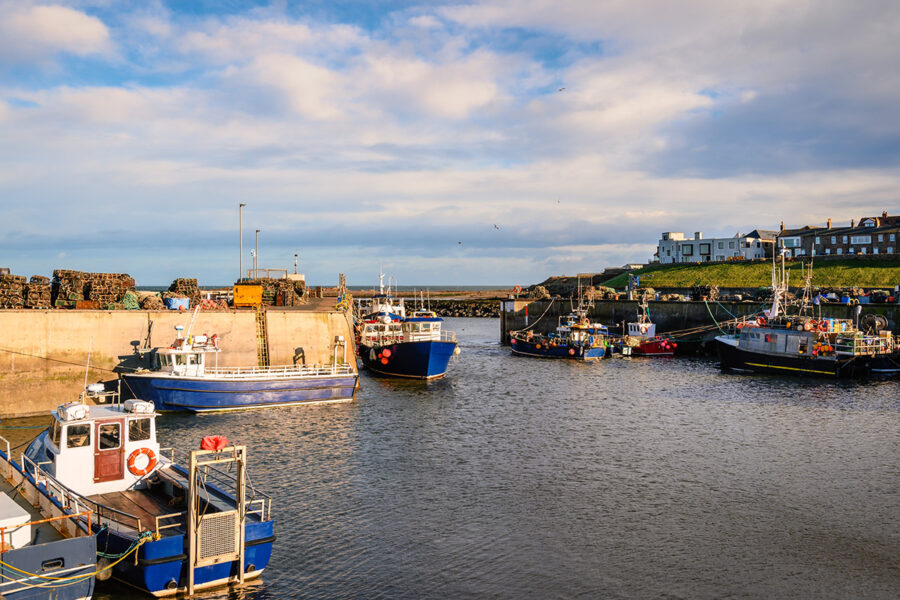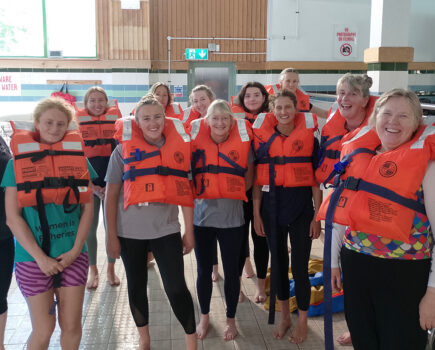Medical certificates, NGO pressures on prawn trawling, a possible cod quota cut in 2024 and shellfish deaths linked to dredging in the river Tees are all major issues facing fishermen in the North East of England.
These issues were spelled out by Dick Brewer of Whitby, the new chairman of the NFFO’s North East Committee, who has taken over from Ned Clarke.
The federation is splitting the North East region into two parts because it feels the area is too big to be covered adequately by one committee. The northern area will extend from Whitby to the Scottish border, and the southern part from Whitby to the Humber. Dick Brewer is chair of the northern part of the committee, and a chairman is due to be appointed soon for the southern half.
Whitby is roughly the mid-point of the region, and the remains of the trawling sector on the North East coast is north of Whitby, while potting now predominates in Whitby and to the south.
Dick Brewer said one of the biggest concerns for fishermen in the region, as throughout the country, is the looming 30 November deadline for fishermen to meet the requirements of the ML5 medical certificates, and in particular the BMI weight issue.
“A lot of the lads are big guys, but they’ve been doing the job for years. They know their capabilities and work to that,” he said.
“It’s another layer of bureaucracy we can do without at the moment, and I hope and pray that they do put it back from November, because people are struggling with weight.
“My two sons run our boat Atlas on fishing and guard work. One is tall and really fit and gets under the BMI – just. The other is over the BMI but is a regular swimmer, an athlete. He does 120 lengths of the pool when he comes in, but he’s over the BMI and has been told to lose weight!
“It’s a sledgehammer to crack a nut, and I hope we can get the date put back and get more talks with the MCA.”
Another concern is the mounting pressure from environmental NGOs on the important prawn fisheries in the region.
Dick Brewer said the NGOs blamed ‘heavy metal gear’ for damaging the seabed, but pointed out: “Prawn gear is actually very light gear, and there are that many restrictions with panels and one thing and another I would have thought it was an eco- friendly way of catching.
“We’ve got the Farne Deeps recovery programme, which my predecessor Ned Clarke played an important part in setting up, and which seems to be working very well. We’ve got a lot of restrictions on catches, so I don’t know where they’re coming from on that one.
“If that fishery was taken away from the North East coast of England and Scotland, it would be devastating. It’s one of the mainstay fisheries at the moment with the other quotas being so low.”
He said the effects of the shellfish die-offs in the Tees and North Yorkshire region that began in October 2021, and are being linked to contaminated spoil from Tees dredging, are still being felt.
“Lobster and crab catches are nothing like they used to be. They haven’t done too badly for lobsters this year because they are not affected by pyridine like crabs are, but the crab catches are down ridiculous amounts.”
He said he could not comment too much on the situation because legal proceedings were underway. The shellfish deaths had ‘totally ruined’ some people at Redcar, Saltburn and Hartlepool and there was a possibility of claims for compensation.
Cod cut a major concern
Dick Brewer said fishermen in the region are also worried about the ICES advice for a 17% cut in the North Sea cod TAC next year.
“When are they going to leave cod alone?” he said. “They’ve managed to decimate the east coast trawling fleets from ports like Bridlington, Scarborough, Whitby and Humberside over the years.
“There’s been that much advice and cod plans over the years, but boats are having to steam away from cod at times because there’s so much of it. There are areas where you can fill up with cod, yet they keep telling us there’s nothing left. “We managed to get the quota up a wee bit this year, but now we’re facing another cut next year – we’ll be fighting this cod situation with our Scottish counterparts.”
He said haddock and whiting quotas were up but ‘we’ve hit a brick wall’ on prices and marketing, particularly for smaller fish.
“We were catching a lot of haddock and whiting a couple of months ago, but the market price was very, very low for the smaller ones, though they got better as the quality went up.
“Once a lot of fish is put ashore now on certain days in Peterhead, or even in Shetland now, the market is very easily flooded with smaller haddock and whiting, so on a winter fishery, which could be predominantly smaller fish, we could be running into market difficulties again like last year.”
Dick Brewer said they try to operate the family boat out of Whitby as much as possible, but have to land into North Shields because all the supporting infrastructure has gone. “It’s not viable to land in Whitby, and it would just go on the back of a wagon anyway.”
This story was taken from the latest issue of Fishing News. For more up-to-date and in-depth reports on the UK and Irish commercial fishing sector, subscribe to Fishing News here or buy the latest single issue for just £3.30 here.
Sign up to Fishing News’ FREE e-newsletter here.








